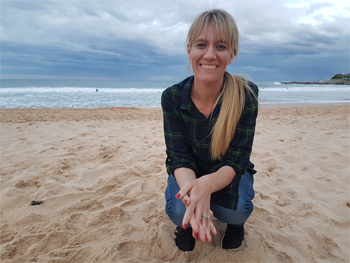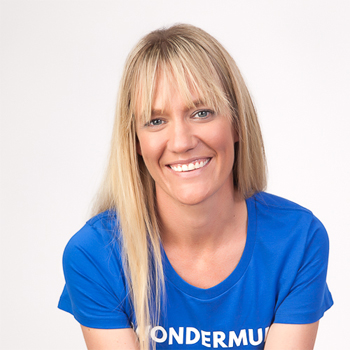Kristy Ross WONDERMUMS Interview

Kristy Ross WONDERMUMS Interview
Australian women facing the everyday challenges and adjustments associated with motherhood, can now access support through an Australian first, online platform. WONDERMUMS has been launched to offer accessible psychological support to help address common challenges faced in the postnatal period.
According to Australian data, over 1,800 Australian parents are diagnosed with postnatal depression each week. The prevalence of postnatal depression continues to have a major impact on the Australian economy, with over $433 million being spent annually to cover healthcare costs and loss of productivity due to the condition.
There are many women who have undiagnosed postnatal depression and continue to struggle with the adjustments and emotional upheaval of motherhood. WONDERMUMS has been established to offer Australian mums the support they need so they no longer suffer postnatal challenges in silence.
WONDERMUMS is an online platform that gives women the chance to subscribe to a postnatal program designed to help navigate common challenges following childbirth. These might include such things as adjusting to the physical and emotional demands of motherhood, managing high and often unrealistic expectations, difficulty maintaining healthy lifestyle patterns that are conducive to good mental health, and navigating the relationship changes that occur with a growing family.
Founder and clinical psychologist, Kristy Ross, said there was a need to create an accessible program that provides Australian women with the guidance and support they would receive from a trained healthcare professional from the comfort of their own homes.
'From my experience in private practice and working with women who have perinatal mental health issues, it was clear that something needed to be done to ensure all women can access support. The reality is, there are many barriers for mums seeking face-to-face support from a healthcare professional, so we created an online program that gives women a structure to work through a broad range of issues that mums face," said Ms Ross.
According to Ms Ross, Australian women often feel pressure to live up to unrealistic expectations that society and us as mums place on ourselves.
'Carrying these expectations into motherhood sets us up to continually fall short, impacting our confidence and stopping us from sharing our challenges with other mums. The willingness to share our struggles with each other, not only increases the support we receive within our immediate social group but it also starts to normalise the challenges of motherhood and shift societal expectations and standards. Motherhood can be a wonderful experience but it is also OK to admit that there are many moments where it feels overwhelming," said Ms Ross.
'It's incredible the impact that social media and other online outlets have on our expectations. Every day we have a constant stream of images placed in front of us that set unrealistic expectations. This leads to women feeling pressured to juggle motherhood with an active social life and to get their pre-baby bodies back."
The WONDERMUMS postnatal program is self-paced and addresses topics such as establishing realistic expectations, developing healthy lifestyle patterns, creating helpful thinking strategies, body image acceptance and managing changes to partner relationships.
The program is designed to break down some of the barriers that may prevent women from seeking help. Women do not require a referral from a healthcare professional or to attend face-to-face session to participate.
There is a free trial period for the postnatal program, which includes screening participants using the Edinburgh Postnatal Depression Scale. For those mums whose scores indicate that they may be experiencing symptoms of postnatal depression, WONDERMUMS also offers the ability to purchase an online clinical assessment with one of their perinatal specialist psychologists. There are measurement tools at the beginning and end of the program to help all participants measure their mood and see if improvements have been made after completing the program.
In addition to the Postnatal program, WONDERMUMS also provides Skype consultations with a perinatal specialist psychologist to offer additional support if needed.
Teira Jansen decided to sign up to the WONDERMUMS postnatal program to help her cope with the lifestyle changes associated with parenthood.
'The moment I became a mum for the first time was truly amazing. But I really wasn't prepared for what was to come. I struggled with the lack of sleep, breastfeeding and did not enjoy the monotony of being at home when I was accustomed to social interaction and the mental stimulation I received from work. I joined WONDERMUMS postnatal program to access the support I felt I needed during this transitional time in my life. The program showed me that I wasn't the only new mother feeling this way, and helped me shift my expectations and start to be more accepting towards myself," said Belinda.
For more information and to sign up for your free trial, visit www.wondermums.com
 Interview with Kristy Ross, Founder of WONDERMUMS
Interview with Kristy Ross, Founder of WONDERMUMS
Question: What is WONDERMUMS?
Kristy Ross: WONDERMUMS Is a series of online programs that have been designed to support a mum's emotional wellbeing throughout all stages of motherhood. Our first program that we have launched this week is our postnatal program which focuses specifically on managing the challenges and adjustments that a mother experiences during the first 12 months after childbirth.
Question: What inspired the idea for WONDERMUMS?
Kristy Ross: First and foremost, I am mum to three boys – my eldest who is 6 years old and my twins who are 4 – so I have firsthand experience of how challenging this time in a mum's life can be. When you become a mum, there are pressures to live up to the -perfect mum' image and this was certainly the case for me, particularly with my firstborn. As you move through motherhood, you realise that every mum has their good days and bad days and you were not in fact alone or some kind of failure after all! I realised that if we could normalise these experiences, we wouldn't have such high expectations on ourselves, would feel more supported and we may be better prepared to meet and deal with these challenges more effectively.
I am also a Clinical Psychologist, so I was really in the perfect position to bring together all of the best information and psychological strategies to assist mums in adjusting to this huge time in their lives. Knowing how time-poor mums can be, it was important that I did this in a way that was convenient, affordable and accessible so an online platform that every mum could use from the privacy of their own home was the perfect way to achieve this.
Question: Can you talk us through how you hope to break down the image of the -perfect mother'?
Kristy Ross: WONDERMUMS really aims to remind all mums that the idea of the -perfect mother' is a myth – it simply doesn't exist. We mould what we consider to be the best bits of other mums (e.g. The mother who is always dressed immaculately, the mother who is always spending quality time with her child, the mother who seems to manage the household chores with ease) into one fictitious character and we use this as the gold standard by which we judge our own ability as a mum. We create the expectation for ourselves that we need to have it altogether, all of the time, but because it is an unrealistic and unachievable image, we fall short time and time again which has a negative impact on our self-worth. By acknowledging the challenges all mums experience and sharing these experiences with each other, we start to create a new image – that of the WONDERMUM – which is grounded in reality.
Question: What are some of the common challenges faced in the postnatal period?
Kristy Ross: The postnatal period is such a huge adjustment not only for mums but for their partners too! It really is a time in a woman's life where everything changes and women are learning new skills that take time and patience to feel confident with (e.g. Breastfeeding, sleep settling, changing nappies). The biggest challenge that mothers tend to experience of course relates to sleep disturbances due to the demands of their new baby and this can have a significant impact on their emotional wellbeing. Meeting the demands and responsibilities of a new baby often means that previous lifestyle habits conducive to good mental health (e.g. Exercise, healthy and balanced diet, socialising) are difficult to maintain simply due to a lack of time and fatigue. Physically, women are experiencing hormonal upheavals and changes to their body shape and appearance, some of which are totally unexpected and which feel very foreign. And if that isn't enough, when you go from a unit of two to a family of three, the relationship you share with your partner also begins to change in nature and if this isn't worked through openly and with the support of each other, it can cause conflict within the relationship.
 Question: Why do you think many mothers do talk about these challenges?
Question: Why do you think many mothers do talk about these challenges? Kristy Ross: Within society the image of the -perfect mum' really does keep a lot of mums silent with regards to the struggles they are otherwise facing during this time in their lives. When you are faced with media images (e.g. In the news, in magazines, on social media) that portray motherhood as a time of perfect bliss, or one that is supposed to come very naturally to all women, or a time where you can (and should) have it altogether, all of the time, and then your reality is very different to these images (which it often is), you are left feeling very inadequate and a lot of shame. No one wants to feel inadequate or judged and so it is natural to want to hide these challenges and experiences from friends and family and all the other mums you might come across. Silence fuels shame, however, and so it becomes important that we give ourselves and each other the permission to be vulnerable and say it how it is.
Question: How can family and friends address these challenges?
Kristy Ross: Support is absolutely vital during the postnatal period but mothers are not very good at reaching out and asking for help! The more friends and family can be aware of the challenges during this time, and the signs and symptoms that their partner/daughter/friend may not be coping or need more assistance, the quicker they can get the help they very much need. Outside appearances don't always tell an accurate story and so even though it looks like she is coping with things just fine, don't be afraid to sit down and have an honest and open conversation about how she is feeling and if there is anything you can do to support her more.
Question: How do you hope to use WONDERMUMS to decrease the postnatal depression rates, in Australia?
Kristy Ross: The WONDERMUMS postnatal program screens every mother for symptoms of postnatal depression and anxiety. For those whose scores indicate that they may be exhibiting signs of depression and/or anxiety, we provide guidance on where they can go for further follow-up and support. We know that early intervention of PND/A is vital for effective treatment and so any opportunity to screen mothers and guide them into appropriate support services, will help to limit the impact of these mental health concerns on not only the mother but their baby too. WONDERMUMS equips every mum with the skills needed to manage their challenges effectively and this may have the added benefit of preventing more serious symptoms developing in those mums at risk of developing depression and/or anxiety.
Question: What are the postnatal depression symptoms family should look for in new mums and dads?
Kristy Ross: Symptoms to look out for include:
Low, flat, teary or irritable mood (Dads can be particularly prone to irritable/angry outbursts)
Sleep disturbances (either sleeping too little or too much) that are unrelated to the demands of the baby
Low motivation and extreme fatigue
Feelings of worthlessness or excessive guilt about their worth as a mum
withdrawal from friends and family
decreased ability to concentrate or think clearly
Thoughts of harming one's self or baby
Those with anxiety might have a feeling of impending doom, racing thoughts or physical symptoms such as a racing heart, nausea, or tight chest.
It is important to remember that the postnatal period can make symptoms of depression difficult to identify as some of the symptoms such as sleep and appetite disturbance overlap with symptoms of depression. If symptoms are persistent, occur more days than not, and impact someone's ability to function in daily life, then it is worthwhile seeking further support and treatment.
Question: What's a typical day like, for you at WONDERMUMS?
Kristy Ross: The past 12 months have been hectic as we have been developing the postnatal program and my days are constantly changing and unpredictable! I have been balancing many roles – being a mum, running a busy private practice, and creating a postnatal program that I feel proud of bringing to all mums. This has meant many long days of research articles, talking with other mums and their experiences, writing, filming, and juggling many balls at once.
Question: How can Australians support WONDERMUMS?
Kristy Ross: I think the question needs to be how can Australia support our mums as WONDERMUMS really has been developed with this as our main priority. We want to create a community of mums who take care of themselves and each other, and who are not afraid to portray a realistic account of their experiences. The more we can share the WONDERMUMS programs (e.g. Create awareness amongst friends and family) and get these important messages out amongst our mums and within society, the quicker we can start to breakdown the unhelpful -perfect mum' images and the more effective we will be at supporting every mum's emotional wellbeing.
Question: What's next for WONDERMUMS?
Kristy Ross: It is really important to us that we are providing the latest and most up to date resources and skills to our mums so our programs will be continually updated to reflect this. WONDERMUMS also recognises that the challenges of motherhood don't start and end during the postnatal period. We know that there are other stages throughout motherhood (e.g. Pregnancy or the time when mums are due to return to work and balance dual roles of motherhood and work) that can bring their own unique adjustments and so we will be keeping ourselves busy creating additional programs targeted to these needs.
Interview by Brooke Hunter
MORE



